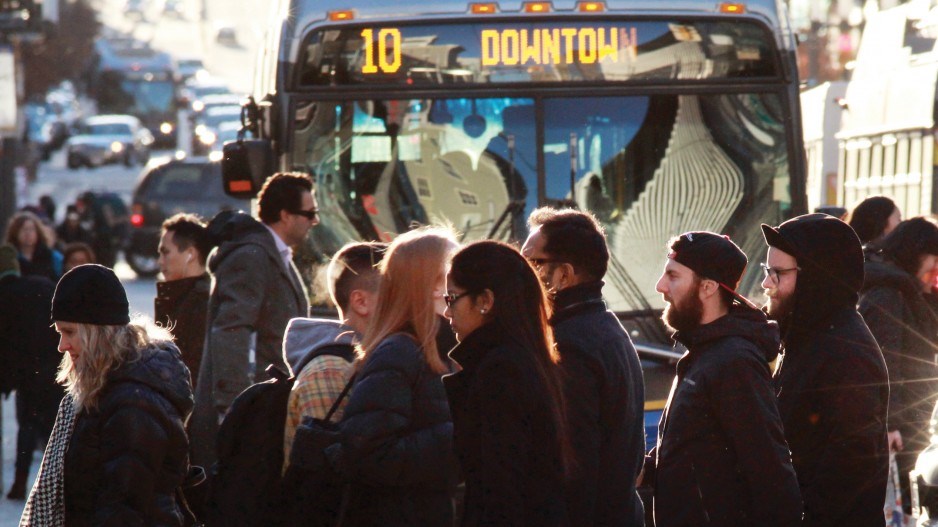For the first time in 15 years, Lower Mainland bus drivers, Seabus operators and maintenance workers have voted to strike, and the union that represents them says TransLink's ongoing funding stalemate is a main reason for the unrest.
Overcrowding on buses, pass-ups (when the bus is full and can't accept any more passengers) and passenger frustration have gotten steadily worse, and that's led to more being asked of drivers and an increasingly stressful work environment, said Gavin McGarrigle, B.C. area director for Unifor.
"What we've seen in the last number of years is no net increase in [transit] service," McGarrigle said. "We're seeing the drivers experience 1,100 pass-ups a day."
On April 28, members of Unifor locals 111 and 2200 voted to strike if an agreement cannot be reached on a new collective agreement with their employer, Coast Mountain Bus Company.
In a statement, the company said it is continuing to negotiate with the union and is hopeful a strike can be averted. There are no current service distruptions, the company said. The strike vote allows the union to issue a strike notice, which it has yet to do, and McGarrigle confirmed the union is committed to continuing the talks with the employer.
TransLink currently does not have the funds to expand service, even as the region adds residents at a rapid pace. Attempts to raise money through mechanisms like a vehicle levy, increased fares and property taxes have all been rejected by either the provincial or regional government. The most recent political battle played out in 2015, when Metro Vancouver residents voted no to a proposal to add a 0.5% regional sales tax to partially fund a $7.5 billion transit expansion plan that would have included more buses across the region and new rapid transit lines for Surrey and Vancouver.
The new Liberal federal government has promised more funds for transit for Canadian cities and has raised its commitment from the traditional one-third federal, one-third provincial, one-third municipal infrastructure formula to 50% of funding from federal sources for the transit projects it commits to fund.
Municipal funding is still the missing piece of the equation, said Nathan Wood, president of Unifor local 111. The requirement that any new source of funding pass a plebiscite vote, which came into force in February 2015, is still on the books.
"The province is already there, the problem is that the mayors are the ones that are left struggling with how to find a way to create their portion of the funding," Wood said. "The province's responsibility to this is that they are not allowing the mayors to, with their own liberty, find those mechanisms."
Transit workers are also unhappy they have so far not been offered the same rate of increase that other public sector workers have received as part of the provincial government's strategy of tying wage increases to B.C.'s economic growth. Wood said the top rate of pay for transit workers is currently $30.91 an hour, which is in about the middle of the pay scale when compared to other transit agencies. The last raise workers received was a 1.75% increase last year when the current contract was extended for one year, McGarrigle said.
In the case of a full strike action, buses and Seabus would not operate, but SkyTrain and the Canada Line would continue to run as they are owned by separate companies, a TransLink spokesman said.
In 2001, a summer bus strike lasted four months before the B.C. government passed back to work legislation. During the strike, SkyTrain operated, but there were no fare checks. That would likely not be the case if a strike were to happen now because the transit police, a force created in 2005, would still be on the job, as would SkyTrain attendants, who are employed directly by the British Columbia Rapid Transit Coroporation, said the TransLink spokesman. Fare gates on both SkyTrain and the Canada Line are now also in place as part of the new Compass card system.
Business in Vancouver was not immediately able to reach Unifor for comment.
@jenstden




